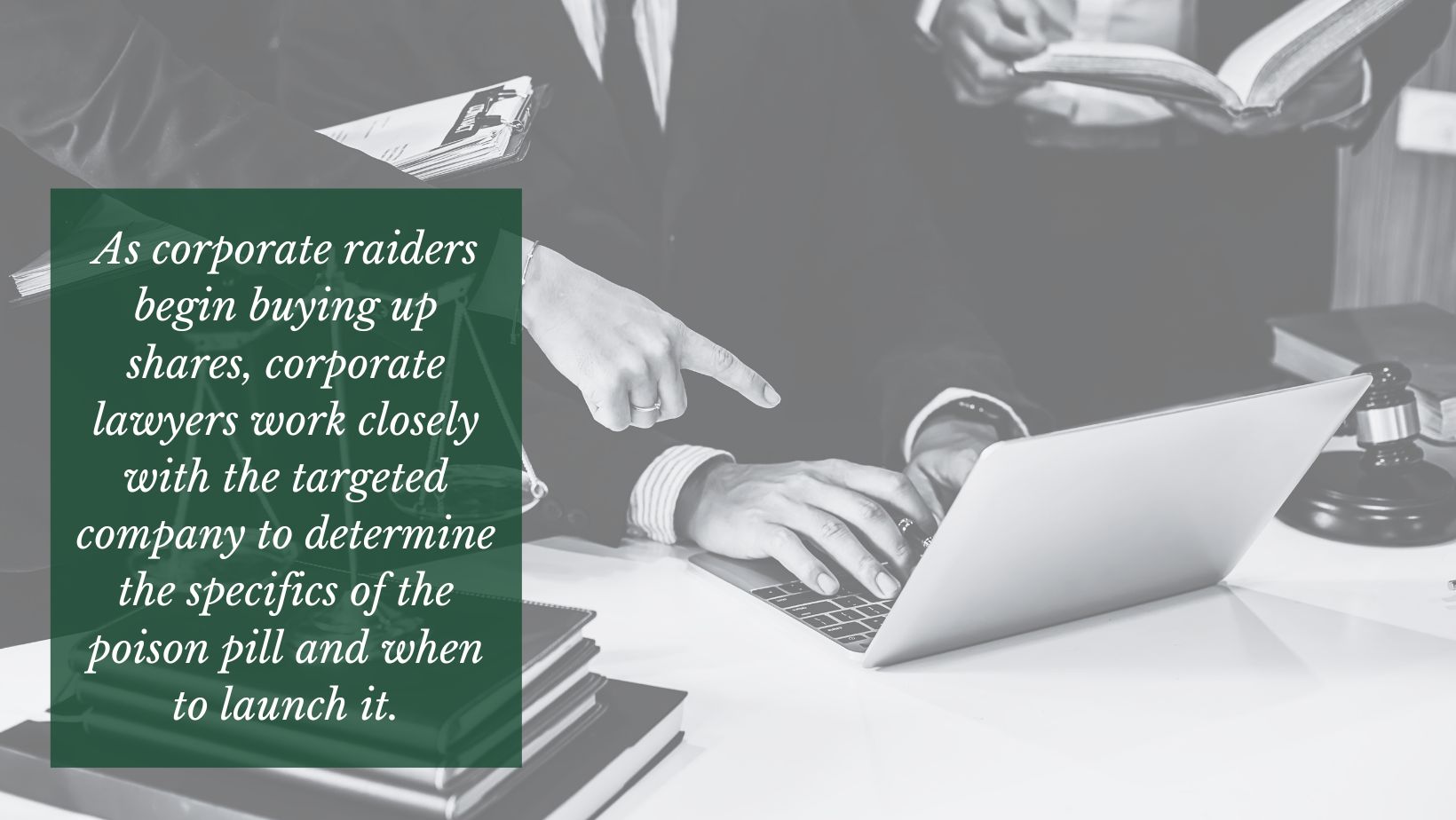
What is a “Poison Pill” in Corporate Law?
When a larger company tried to take over the company owning the St. Louis Post-Dispatch in 2022, corporate lawyers showed Lee Enterprises how to fight back. They crafted a poison pill defense, or shareholders rights plan, to kill the unsolicited offer from Alden Global Capital. The defense worked, and Lee still owns the Post-Dispatch and 22 other papers.
Corporate lawyers often recommend poison pills for defense against corporate raiders. Sometimes the acquirer backs off. Other times, the targeted company and the acquirer reach a favorable agreement.
How Do Poison Pills, Shareholder Rights Plans, Work?
Poison pills reduce the appeal of a takeover by either making the deal too expensive for the bidder or by creating negative side-effects of a takeover.
As corporate raiders begin buying up shares, corporate lawyers work closely with the targeted company to determine the specifics of the poison pill and when to launch it. For example, a board may stipulate that a shareholders rights plan take effect when the acquiring entity gains 20% of the company’s shares.
Most shareholders rights plans include a stipulation that they can be changed or negated by the board. Thus, the board is forcing the acquirer to negotiate directly with them, which will have a positive position for bargaining.
Corporate lawyers use a variety of ways to launch poison pills including:
- Preferred stock plan: A company issues a dividend of preferred stock to shareholders. These shareholders may use special voting rights when a company tries to takeover by buying a large quantity of shares.
- Flip-in: Many companies include a provision in their charter or bylaws establishing a threshold for buying stock. Before the acquiring entity nears the ceiling, usually between 20 and 50%, the targeted company starts selling stock at a discount to its existing shareholders. This dilution of the company’s stock may prevent the hostile takeover.
- Flip-over: When a company employed a flip-in poison pill and was not able to avoid a hostile takeover, there is another defense mechanism to try: A flip-over poison pill. The shareholders of the targeted company buy up stock at a discount. In doing so, they dilute the shares of the acquiring company’s existing shareholders. This is only possible if a section of the bylaws spells out the legality of the maneuver.
- Back-end plan (also known as a note purchase rights plan): A back-end plan gives shareholders of the targeted company the opportunity to exchange their stock for either cash or other securities at a higher value if the acquiring company gains a majority of the company stock. This strategy may diminish the acquiring company’s interest in purchasing the existing shareholders’ stock.
- Golden handcuffs: Corporate lawyers also may recommend a golden handcuffs poison pill. Many executives have lucrative deals rewarding them when they hit goals and/or stay with the company for a certain period. The “handcuffs” often include deferred compensation and employee stock options. A golden handcuffs poison pill defense removes the vesting and performance requirements. Then, the executives may cash out and leave the company. This often makes the target less desirable to the acquirer who need the executives to lead the company after they take over.

Image by najkhetsamtip by Canva.com
Pros and Cons of Poison Pill Defense Strategies
The ultimate success of a poison pill defense strategy reveals itself years down the road. Boards will consider whether the goals of both companies were met and whether they are still being met when analyzing the success of the shareholders rights plan.
For many companies, the poison pill is a negotiation tactic that succeeds in either 1) preventing a hostile takeover or 2) laying the foundation for a favorable merger. While developing the shareholder rights plan, or poison pill, the company finds a way to dictate the terms of the takeover. The poison pill’s benefits may include:
- The targeted company identifies potential acquisitions.
- Higher premiums for shareholders.
- Slowing the speed of a corporate raid.
In the short term, a poison pill can hurt the valuation of many shares. The decrease in value will affect the company’s constituencies in different ways:
- Shareholders may receive a financial loss when the value of their shares declines.
- Corporate executives who also own part of the company may or may not lose their position, power, or money during a takeover.
- Lower and mid-level employees may be laid off.
Corporate Lawyers Guide Companies Threatened by a Takeover
If another company is positioning itself to get majority ownership in your company, contact the Swiecicki-Muskett law firm. Managing partner Christopher Swiecicki will guide you in developing a poison pill, or another strategy, to lead your company through a hostile takeover proactively and cost-effectively.
Christopher developed his expertise in corporate law as both in-house and outside legal counsel. Today, he provides senior-level counsel to C-suite executives, in-house legal teams, and business owners. He is on the faculty of Washington University in St. Louis School of Law where he teaches business acquisitions (M&A) courses.
Contact the Swiecicki-Muskett law firm at 636-778-0209 or email [email protected].
Latest Posts
Understanding the Annual Gift Tax Exclusion in 2025
This article is a "plain English" draft of an article for the Bar Association of Metropolitan St. Louis. Please reach out if you would like the full...
What is the Outlook for Tax Laws in 2025?
I am again both proud and honored to be co-author with Richard Wise on this article, which first appears in the St. Louis Law Journal Blog. Any errors are...
